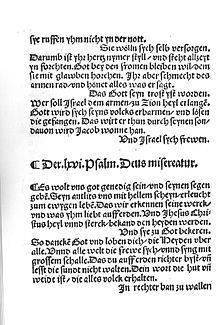Es spricht der Unweisen Mund wohl: Skillnad mellan sidversioner
Hoppa till navigering
Hoppa till sök

Haeffner (diskussion | bidrag) Ingen redigeringssammanfattning |
Haeffner (diskussion | bidrag) |
||
| (7 mellanliggande sidversioner av samma användare visas inte) | |||
| Rad 3: | Rad 3: | ||
[[Fil:Enchiridion geistlicher Gesänge 28.jpg|thumb|right|''Der XIII. Psalm. "Dixit insipiens in cor.'', sid 2, Erfurt Enchiridion, 1524]] | [[Fil:Enchiridion geistlicher Gesänge 28.jpg|thumb|right|''Der XIII. Psalm. "Dixit insipiens in cor.'', sid 2, Erfurt Enchiridion, 1524]] | ||
'''Es spricht der Unweisen Mund wohl''', | '''Es spricht der Unweisen Mund wohl''', är en Luthersk [[psalm]] med ord av [[Martin Luther]] från 1523, publicerad som nr 6 i [[Achtliederbuch]] 1524. | ||
== Text == | |||
Texten utgår från [[Psaltaren 14]]. På latin lyder titeln [[Dixit insipiens in cor]]. Luther skrev sex strofer med vardera sju rader. | |||
== | == Översättningar == | ||
Svenska: [[Then ogudachtige säger så]] | |||
Engelska: ''The mouth of fools doth God confess'' som fanns i [[R Massie]]s ''[[M Luther's Spiritual Songs]]'', 1854. | |||
The | |||
== Melodi == | == Melodi == | ||
I [[Achtliederbuch]] anges melodin till [[Es ist das Heil uns kommen her]] men i [[Erfurter Enchiridion]] anges en annan melodi, [[Zahn]] Nr 4436, | |||
Även Pachelbel och Bach har nyttjat melodin | |||
== Publicerad i == | |||
* [[Achtliederbuch]] som nr 6 | |||
* [[Erfurter Enchiridion]] som nr 15 | |||
== Se även == | == Se även == | ||
* [[Martin | * [[Martin Luther, psalmlista]] | ||
* [https://hymnary.org/text/es_spricht_der_unweisen_mund_wohl Es spricht der unweisen Mund wohl] på [[Hymnary.org]] | |||
*[https://hymnary.org/text/es_spricht_der_unweisen_mund_wohl Es spricht der unweisen Mund wohl] | * [https://hymnary.org/text/the_mouth_of_fools_doth_god_confess The mouth of fools doth God confess] på [[Hymnary.org]] | ||
*[https://hymnary.org/text/the_mouth_of_fools_doth_god_confess The mouth of fools doth God confess] | |||
== Källor == | == Källor == | ||
<references/> | |||
[[Kategori:Psalmer av Martin Luther]] | [[Kategori:Psalmer av Martin Luther]] | ||
Nuvarande version från 23 juli 2024 kl. 10.16

Der XIII. Psalm. "Dixit insipiens in cor., sid 1, Erfurter Enchiridion, 1524
Es spricht der Unweisen Mund wohl, är en Luthersk psalm med ord av Martin Luther från 1523, publicerad som nr 6 i Achtliederbuch 1524.
Text
Texten utgår från Psaltaren 14. På latin lyder titeln Dixit insipiens in cor. Luther skrev sex strofer med vardera sju rader.
Översättningar
Svenska: Then ogudachtige säger så Engelska: The mouth of fools doth God confess som fanns i R Massies M Luther's Spiritual Songs, 1854.
Melodi
I Achtliederbuch anges melodin till Es ist das Heil uns kommen her men i Erfurter Enchiridion anges en annan melodi, Zahn Nr 4436,
Även Pachelbel och Bach har nyttjat melodin
Publicerad i
- Achtliederbuch som nr 6
- Erfurter Enchiridion som nr 15
Se även
- Martin Luther, psalmlista
- Es spricht der unweisen Mund wohl på Hymnary.org
- The mouth of fools doth God confess på Hymnary.org
